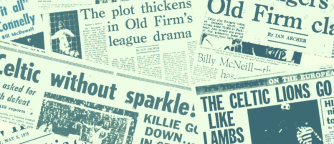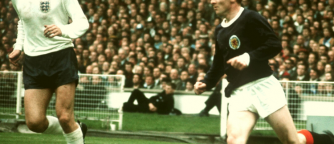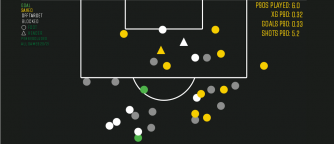The cold logic underpinning the re-hiring of Brendan Rodgers is difficult to argue with, writes Scott Fleming, but it does give Celtic fans a chance to re-evaluate their relationship with the occupants of the manager’s office.
Perhaps the first thing to say is that there’s no right or wrong way to be feeling about this.
Some people are overjoyed by Brendan Rodgers’ return as Celtic manager, some people feel dismayed, betrayed even, whilst others – perhaps the majority – find theirselves somewhere in the middle, confused and conflicted by it all. From the very moment the rumours began there has been a rush to delete old Tweets and edit together compilations of “be careful what you wish for” and all those other big ‘mic drop’ moments from Rodgers’ first stint at Celtic Park; even to dig out clips of him saying nice things about Celtic during his time at Leicester City, in a strange attempt to depict him almost as a wartime hero who’d been conscripted into fighting elsewhere but was still pining for his one true love back in Glasgow, stroking his little sepia-toned wallet photo of Paradise as he settles down in his foxhole (see what I did there) every night. Meanwhile, the long, drawn-out nature of the negotiations over the past fortnight or so has allowed many of us who started off feeling queasy about the idea to slowly warm to it, to gradually be seduced by the dripfeed of detail via Twitter and Scottish Daily Mail scoops, and by the relative paucity of proven quality amongst the other candidates for the job.
None of these subgroups deserves to be gaslit by another. It is perfectly legitimate to be excited about the appointment of a manager who has spent the last few years guiding a provincial club to FA Cup glory and the cusp of Champions League qualification (twice), and who has been the subject of serious and sustained links with the Manchester United and Chelsea jobs. At the same time, it is neither childish nor petty to still begrudge the fly-by-night nature of Rodgers’ exit four years ago, and to wonder whether a club as big as Celtic, with a talent-rich squad, outstanding facilities, a domestic stranglehold and guaranteed Champions League football next season, couldn’t have cast the net a little wider, instead of making a beeline for the man who subjected the institution to major public humiliation less than five years ago. It may seem an odd thing to say about a period where the club has won five trebles and collected so many honours they’ve probably had to reinforce the floor of the trophy room, but when looked at in the full context of Celtic’s history, the last 10 years or so has been a period of instability at Parkhead, with five changes of manager since the first Neil Lennon era ended in 2014. So why, some will inevitably ask, tee yourself up for another bout of disruption in the near future by re-hiring a man with such infamously itchy feet?
Brows have been furrowed and chins have been scratched over the 50-year-old’s often fractious relationship with the board last time, his transfer record and his capability in Europe. His best moments – the cup finals, the invincible season, the two draws against Manchester City, the myriad skelpings of Rangers – have been loaded onto the scales and weighed against the scattered low points: AEK Athens, 7-0 against Barcelona, 7-1 against PSG, back-to-back defeats away to Steve Clarke’s Kilmarnock.
There is, nonetheless, a cold, hard logic at the core of this decision which is ultimately difficult to argue with. Kjetil Knutsen might just be the next big thing in European football management. Or he could be another Ronny Deila. Francesco Farioli could be the next Roberto De Zerbi, but he could also be the next Angelo Alessio. The great irony of Celtic Football Club is that it’s a club for hopeless romantics ran by cold-blooded pragmatists. Whatever else was discussed at the board meeting where the decision to pursue Rodgers was made (assuming there was one, and not just a diktat passed down from on high by the man with the curly whiskers), you can bet ‘the fans will be raging’ was not one of the bullet points on the agenda. The appointments of Deila and Ange Postecoglou proved the Celtic board are not completely averse to taking the odd exotic risk, but in both cases they were in need of a quick solution after being blown out by a more mainstream candidate. More often, especially when hiring from a position of strength, they simply want to keep the faucet of prize money, sponsorship and merchandise revenue flowing by going out and getting the biggest and best name available. Two years ago that name was Eddie Howe – until it wasn’t. This summer, that name is unarguably Rodgers.
There might be an alternate reality where the merch stands on London Road are selling out of sombreros and tactics nerds from all over the world are flocking to Parkhead to drool over a Celtic team managed by Andoni Iraola and brimming with Spanish imports, but the prevailing sense of realpolitik in the Celtic boardroom meant it was never likely to become our reality. At a club where nearly everyone in a senior position has either already worked there before, or is related to someone else in the hierarchy, the comfy familiarity that Rodgers offers must have been irresistible.
The truly fascinating part is what happens next. Having failed to win a knockout tie in Europe since before Ben Summers was born, the leaked chat about Rodgers being given a substantial transfer budget with a clear aim of breaking new ground on the continent will have won over many of the fans who were on the fence about the Irishman’s return. But will the manager spend that money in eclectic foreign markets like Japan, Argentina and Canada, the way Postecoglou did, or mainly focus on the top two tiers in England, like he did (with a diminishing hit rate) in his first spell at Lennoxtown?
It’s one of the questions Rodgers might be asked during his unveiling later this week, an occasion where you’d like to think he’d be old and wise enough to play it as boring and safe as the club’s announcement was on Monday, without playing to the gallery with any grandiose claims of love and loyalty, or a Clyde Tunnel anecdote mark II. But who knows? If comments on social platforms are anything to go by, the battle of public opinion is already 90% won, with almost anticlimactic ease.
What this appointment does do is give the Celtic support as a whole the chance to re-evaluate their relationship with the occupants of the manager’s office. The cycle from hero worship into vilification that played out with Rodgers first time around, and to a lesser extent with Postecoglou, has been emotionally draining and sometimes downright depressing to live through.
The easiest thing to do is blame the fans for building a cult of personality around anyone that does the job with a degree of success. Fair enough, but it takes two to tango. Clearly there is something about this football club that compels not just natural showmen like Rodgers, but even the gruff and slightly more awkward types like Ange, to overdo the love-bombing and make grandiose statements which come back to bite them when they’re lured elsewhere. With the second coming of Rodgers, in theory at least, both parties should still be too scarred by memories of 2019 to make the same mistakes. A business-like, transactional relationship with a manager everyone knows isn’t going to be here for long, with no misunderstandings or illusions about empire-building? Strange as it sounds, it might be exactly what the club and the fans need at this point.












I have said from day one when Rodgers left in 2019, he was the best thing that happened to Celtic since Jock Stien. He introduced new words to the Celtic supporters like “ invincibles” and “double treble” and we muttered words like treble treble when he left. Let’s hope we can hit the same heights in this new term.
Excellent assessment of the situation, and very well written too. You could go far!